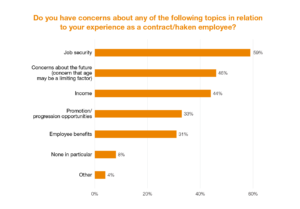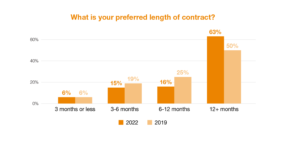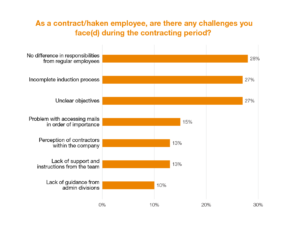Member? Please login
Robert Walters Japan | “What companies can do regarding concerns about job security”

Written by BCCJ
November 25, 2022
Member News
Specialist bilingual recruitment firm Robert Walters Japan announced the results of a survey of 371 front-line contract and haken (temporary) professionals at foreign-affiliated and Japanese global companies on 22 November. The survey was conducted to provide recommendations for those involved in corporate management and talent management at companies that call for global HR with language skills and specialized skills to work.
Challenges and concerns contract and temporary workers face while working
In Japan, where there is a severe talent shortage, it is important for companies to remove as many issues and concerns as possible that contract and temporary workers have when they are working. This is not only as a measure against labor shortage, but also because it will lead to the creation of a comfortable working environment for all. In addition, hiring talented contract and temporary workers is the key for companies to navigate and survive through economic uncertainty in the Japanese market. When asked about concerns/issues with regards to contract and haken workers, “job stability” (59%) came in first, followed by “concern about the future (concern about age restrictions)” (46%) and “income” (44%).

The pandemic caused a change in attitudes toward job searching among about 40% of the respondents.
Next, when asked whether the COVID-19 pandemic caused a change in their attitudes toward job search, as a matter related to “job stability,” about 40% (39%) of contract and haken employees responded positively. Among them, 15% of all respondents said that they had come to place more importance on “job stability,” especially as a permanent employee.
With regards to contract length, which indicates job stability, there is a greater divergence between actual and ideal than in 2019: In the 2019 survey, 50% of contract and temporary workers said their ideal contract length was “12 months or longer,” while in 2022 the figure has increased to 63%. In contrast to the ideal contract length, the actual contract length offered by companies was “3 months or less” (33%) in first place and “3 to 6 months” (29%) in second place.

It can be said that post-pandemic, contract and haken workers are seeking more stability and long- term contracts. It is to the detriment of companies to lose talented employees as they move on to other positions due to the psychological uncertainty of not having ‘job security’. It is therefore important for companies to make this visible by communicating that they are evaluating the employee with a view to extending the contract period, long-term contracts and direct employment, offering a competitive salary with their skills and preparing direct employment positions.
What are the challenges faced on the job?
Furthermore, the challenges faced by contract and temporary employees in their regular work were ranked first: “No difference in duties and responsibilities from permanent employees” (28%), followed by “insufficient explanation of the company and work after joining” and “No clear job description and targets” (27%) in equal second place.
Contract and temporary employees, who find it attractive to acquire skills and be recognised regardless of seniority but lack job security, feel that “no difference in duties and responsibilities from permanent employees” is unequal. In terms of the ‘lack of clarity in job descriptions and targets’, contract and temporary staff may feel that they have chosen a form of employment that does not lead to recognition of their skills. Therefore, it may be necessary for companies to explain the nature of the work sufficiently when signing employment contracts with contract and temporary staff, and to show their utmost efforts to actively convert excellent contract and temporary staff into permanent employees with regards to employment stability.

About Robert Walters Japan:
Established in London, United Kingdom, in 1985, Robert Walters is a specialist recruitment consultancy with operations in 31 countries around the world. Robert Walters Japan established its Tokyo office in 2000 and Osaka office in 2007. For over 20 years, we’ve been a driving force in the Japanese bilingual recruitment market, providing high quality candidates for our clients and access to the best jobs. Our consultants are experts in their respective industries and work in teams to provide recruitment consultation services across a wide range of industries and job categories.
Press contact:
PR & Communications, Robert Walters Japan
Phone: 03-4570-1500 E-mail: [email protected]







